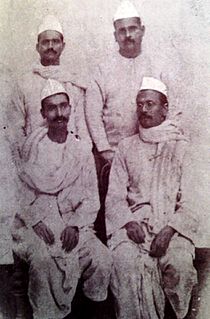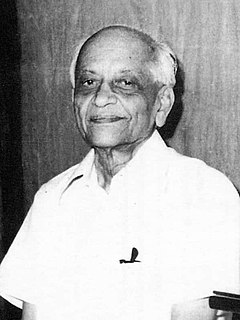Related Research Articles

The Indian independence movement was a series of historic events with the ultimate aim of ending British rule in India. It lasted from 1857 to 1947.

The Communist Party of India (Marxist) is a communist political party in India. It is the largest communist party of India in terms of membership and electoral seats and one of the national parties of India. The party emerged from a split in the Communist Party of India (CPI) on 7 November 1964. As of 2022, CPI(M) is a part of ruling alliances in two states — the Left Democratic Front in Kerala and the Secular Progressive Alliance in Tamil Nadu. CPIM has representation in the legislative assemblies of 9 states.

The Communist Party of India (CPI) is the oldest communist party in India and one of the eight national parties in the country. The CPI was founded in Kanpur on 26 December 1925.

Abul Kalam Ghulam Muhiyuddin Ahmed bin Khairuddin Al-Hussaini Azad was an Indian independence activist, Islamic theologian, writer and a senior leader of the Indian National Congress. Following India's independence, he became the First Minister of Education in the Indian government. He is commonly remembered as Maulana Azad; the word Maulana is an honorific meaning 'Our Master' and he had adopted Azad (Free) as his pen name. His contribution to establishing the education foundation in India is recognised by celebrating his birthday as National Education Day across India.

| death_place = Dehradun, Uttarakhand, India

The Congress Socialist Party (CSP) was a socialist caucus within the Indian National Congress. It was founded in 1934 by Congress members who rejected what they saw as the anti-rational mysticism of Gandhi as well as the sectarian attitude of the Communist Party of India towards the Congress. Influenced by Fabianism as well as Marxism-Leninism, the CSP included advocates of armed struggle or sabotage (such as Yusuf Meherally, Jai Prakash Narayan, and Basawon Singh as well as those who insisted upon Ahimsa or Nonviolent resistance. The CSP advocated decentralized socialism in which co-operatives, trade unions, independent farmers, and local authorities would hold a substantial share of the economic power.

'Gandhism' is a body of ideas that describes the inspiration, vision, and the life work of Mahatma Gandhi. It is particularly associated with his contributions to the idea of nonviolent resistance, sometimes also called civil resistance. The two pillars of Gandhism are truth and nonviolence.

Muhammad Ali Jauhar, was an Indian Muslim activist, prominent member of the All-India Muslim League, journalist and a poet, and was among the leading figures of the Khilafat Movement.

The Champaran Satyagraha of 1917 was the first satyagraha movement led by Mahatma Gandhi in British India and is considered a historically important rebellion in the Indian independence movement. It was a farmer's uprising that took place in Champaran district of Bihar in the Indian subcontinent, during the British colonial period. The farmers were protesting against having to grow indigo with barely any payment for it.

J. C. Kumarappa was an Indian economist and a close associate of Mahatma Gandhi. A pioneer of rural economic development theories, Kumarappa is credited for developing economic theories based on Gandhism – a school of economic thought he coined "Gandhian economics."

Puchalapalli Sundarayya popularly known as Comrade PS was an Indian Communist politician leader and a peasant revolt in the former Hyderabad State of India, called the Telangana Rebellion and he was also one of the founding member of Communist Party of India (Marxist).He was so dedicated to the upliftment of the poor that he and his spouse chose not to have children, for the purpose of social service. He directly participated in Telangana armed struggle against the imperialism of the Nizam of Hyderabad. Sundarayya remained General Secretary of Communist Party of India (Marxist) until 1976.

Puran Chand Joshi, one of the early leaders of the communist movement in India. He was the general secretary of the Communist Party of India from 1935 to 1947.

Shripad Amrut Dange was an Indian Politician who was a founding member of the Communist Party of India (CPI) and a stalwart of Indian trade union movement. During the 20th century, Dange was arrested by the authorities for communist and trade union activities and was jailed for an overall period of 13 years.
Socialism in India is a political movement founded early in the 20th century, as a part of the broader movement to gain Indian independence from colonial rule. The movement grew quickly in popularity as it espoused the causes of India's farmers and labourers against the zamindars, princely class and landed gentry. Socialism shaped the principal economic and social policies of the Indian government but mostly followed Dirigisme after independence until the early 1990s, when India moved towards a more market-based economy. However, it remains a potent influence on Indian politics, with many national and regional political parties espousing democratic socialism.
The Workers and Peasants Party (WPP) was a political party in India, which worked inside the Indian National Congress in 1925–1929. It became an important front organisation for the Communist Party of India and an influential force in the Bombay labour movement. The party was able to muster some success in making alliances with other left elements inside the Congress Party, amongst them Jawaharlal Nehru. However, as the Communist International entered its 'Third Period' phase, the communists deserted the WPP project. The WPP was wound up, as its leadership was arrested by the British authorities in March 1929.

Philip Spratt was a British writer and intellectual. Initially a communist sent by the British arm of the Communist International (Comintern), based in Moscow, to spread Communism in India, he subsequently became a friend and colleague of M.N. Roy, founder of the Communist parties in Mexico and India, and along with him became a communist activist.
Nirmal Kumar Bose was a leading Indian anthropologist, who played a formative role in "building an Indian Tradition in Anthropology". A humanist scholar with a broad range of interests, he was also a leading sociologist, urbanist, Gandhian, and educationist. Also active in the Indian freedom struggle with Mahatma Gandhi, he was imprisoned in 1931 during the Salt Satyagraha.
The history of the Anushilan Samiti stretches from its beginning early in the first decade of 1900 to 1930. The Samiti began in the first decade of the 20th century in Calcutta as conglomeration of local youth groups and gyms. However, its focus was both physical education and proposed moral development of its members. From its inception it sought to promote what it perceived as Indian values and to focus on Indian sports e.g. Lathi and Sword play. It also encouraged its members to study Indian history as well as those of European liberalism including the French Revolution, Russian Nihilism and Italian unification. Soon after its inception it became a radical organisation that sought to end British Raj in India through revolutionary violence. After World War I, it declined steadily as its members identified closely with leftist ideologies and with the Indian National Congress. It briefly rose to prominence in the late second and third decade, being involved in some notable incidences in Calcutta, Chittagong and in the United Provinces. The samiti dissolved before the Second World War into the Revolutionary Socialist Party.
Sisir Roy (1912–1960) was an Indian communist politician and trade unionist. He served as general secretary of the Bolshevik Party of India and the United Trade Union Congress, and was active in organizing dock workers in Calcutta.
Radharaman Mitra was a revolutionary involved with Meerut Conspiracy Case and Bengali writer. In 1981 he received Sahitya Akademi Award for his book Kalikata Darpan.